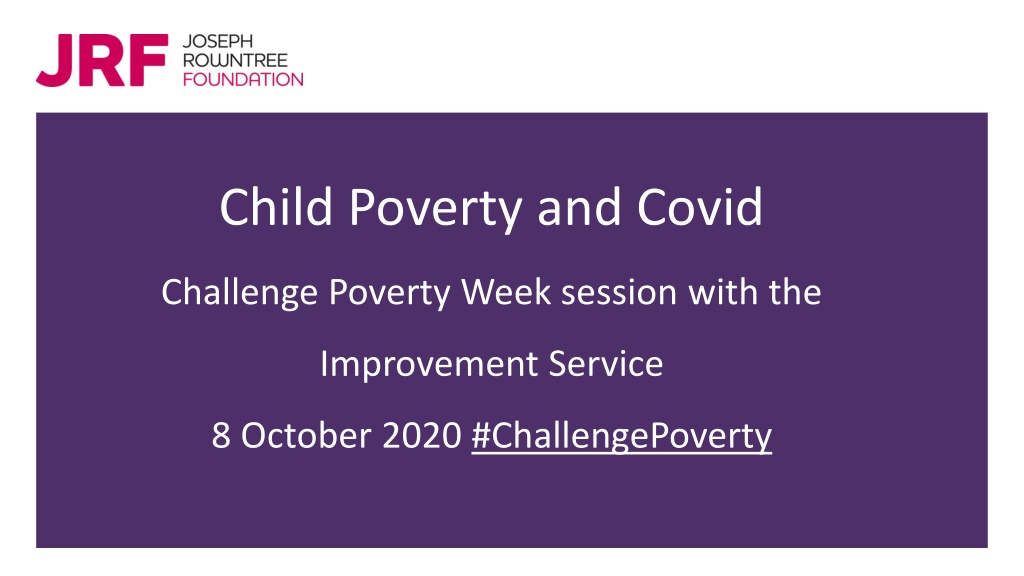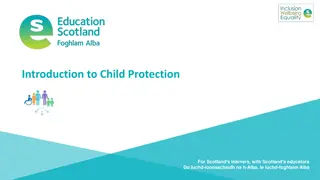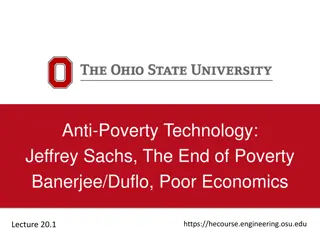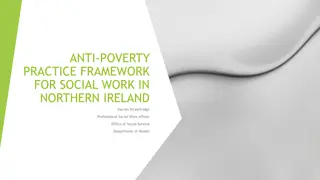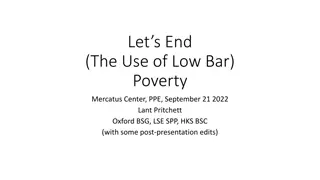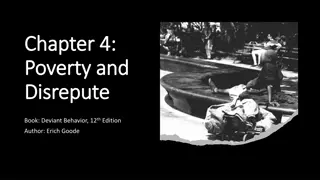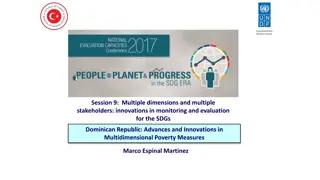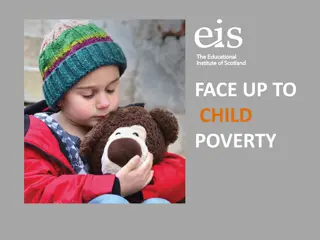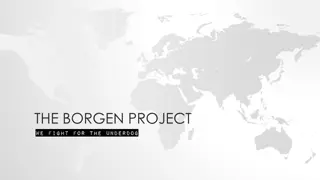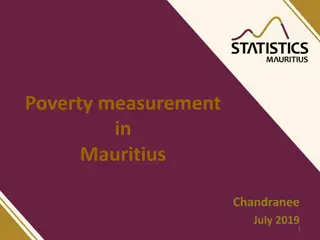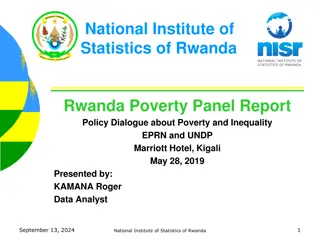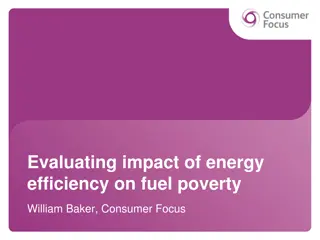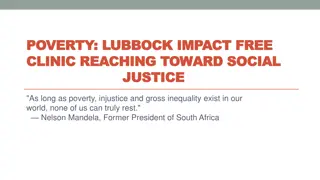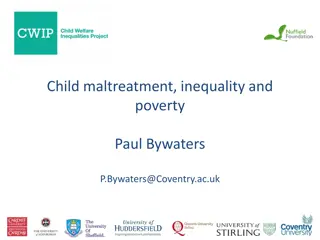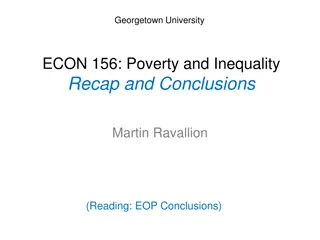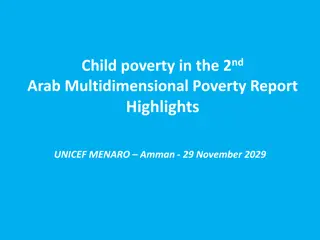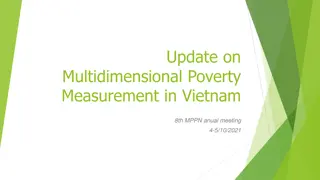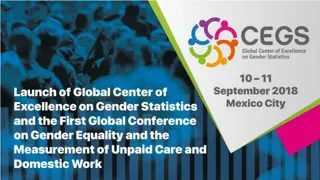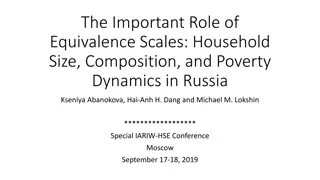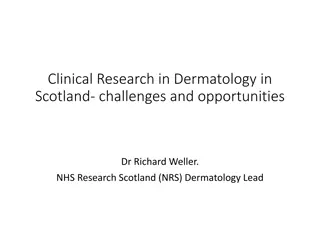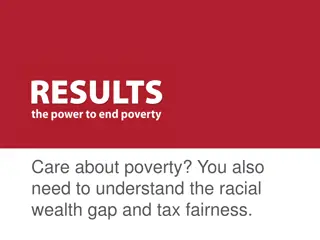Understanding the Impact of Child Poverty and Covid Challenges in Scotland
Figures and data reveal the concerning rates of poverty in Scotland, with various demographic groups facing higher risks. The Covid-19 pandemic has worsened the situation, leading to financial squeeze and decreased working hours. BME communities are particularly affected, experiencing discrimination in employment. Solutions are needed to address these challenges and ensure fairness for all individuals and households in Scotland.
Download Presentation

Please find below an Image/Link to download the presentation.
The content on the website is provided AS IS for your information and personal use only. It may not be sold, licensed, or shared on other websites without obtaining consent from the author. Download presentation by click this link. If you encounter any issues during the download, it is possible that the publisher has removed the file from their server.
E N D
Presentation Transcript
Child Poverty and Covid Challenge Poverty Week session with the Improvement Service 8 October 2020 #ChallengePoverty
Figure 1: Poverty rates vary a lot by characteristics, with many of the same groups having higher risks over time Before the pandemic, just over 1 million Scots of all ages were in poverty. Higher risks for children, renters, disabled people, lone parents, BME groups and households out of work. Scotland not on course to reach interim child poverty targets by Spring 2024. Poverty rate (2016/17 - 2018/19) All Children Working-age Pensioners IN FAMILY TYPE Workless Just part-time work Someone in full-time work Workless over 60 / Retired Lone parents Single without children Couple with children Couple without children Single pensioner Pensioner couple Disability in family No disability in family Three or more children One or two children No children IN HOUSEHOLD TYPE Social rented Private rented Owned with mortgage Owned outright ETHNIC GROUP OF HEAD Non-white White 0% 10% 20% 30% 40% 50% 60% Source: Households Below Average Income (DWP)
Impact of COVID The general skintness has been hard and been exacerbated by changes to how we shop we are having to get more things from the corner shop, which is more expensive than the supermarkets. And because we re both home all the time, we re spending more money on food and fuel. Respondent to survey, Dundee Fighting for Fairness
By May, c. one in three Scottish households were either on furlough, self- employment support or had made a new out-of- work Universal Credit claim. The combined rate was highest in mainland rural authorities followed by Glasgow and West/South Scotland. By August, Moray had the highest furloughed rate (32%). Three quarters (77%) in accommodation & food had been furloughed.
Work: poverty rates by sector and drop in hours Figure 3: Average hours worked have fallen by similar amount across the UK Figure 2: Accommodation and catering, heath and retail have higher rates of workers in poverty. Over four in ten workers in poverty work in these sectors 36 34 Accommodation and food services Average weekly hours worked 32 Wholesale and retail 30 London 28 Human health and social work activities Scotland 26 North East In-work poverty rate (2016/17-2018/19) 24 Other sectors 22 0% 5% 10% 15% 20% 25% Source: Households Below Average Income (DWP) 20 Source: Labour Force Survey
It is a problem that people from BME communities generally are facing discrimination is one of the reasons. People with relevant experience and qualifications find it difficult to secure a well-paid job. They are either not kept in the organisation where the internship has been undertaken or offered a low-paid job. Helping employers to train and then keep hold of people developing a more diverse workforce where their competences are valued One solution would be to raise awareness on workplace discrimination and ensure training is taken up by every organisation in Scotland. Taylor, Glasgow
Social Security: rise in Universal Credit claims by local authority Figure 5: Increases in the proportion of the population on UC vary by Local Authority Glasgow City A significant rise in Universal Credit claims has already happened, in and out of work. Places with high poverty rates before the pandemic have been most affected, but rural areas are at risk due to high proportions of people in sectors supported by temporary protections. West Dunbartonshire North Lanarkshire East Ayrshire North Ayrshire Renfrewshire Midlothian West Lothian South Lanarkshire City of Edinburgh Highland Dundee City Argyll and Bute Fife Falkirk East Lothian South Ayrshire Aberdeen City Perth and Kinross Clackmannanshire Scottish Borders Angus Inverclyde Dumfries and Galloway Moray Na h-Eileanan Siar Stirling Percentage point increase in the proportion of the population on Universal Credit, January to July 2020. East Renfrewshire East Dunbartonshire Aberdeenshire Shetland Islands Orkney Islands 0% 1% 2% 3% 4% 5% 6% 7% Source: DWP
Housing: private rent pressures Figure 6: Average private rents for 2 bedroom properties have risen above inflation in Scotland since 2010, but there are variations across Scotland Scotland Lothian Greater Glasgow Fife Forth Valley West Lothian Highland and Islands Dundee and Angus East Dunbartonshire Perth and Kinross Scottish Borders South Lanarkshire Argyll and Bute Dumfries and Galloway Renfrewshire / Inverclyde North Lanarkshire West Dunbartonshire Mean private rent increase for 2 bed properties 2010 to 2019 change 2018 to 2019 change Ayrshires Cumulative CPI - 2010 to 2019 Aberdeen and Shire -5% 5% 15% 25% 35% 45% 55% Source: Private Sector rent Statistics, Scotland 2019
Edinburgh Poverty Commission A Just Capital A Just Capital A Call to Action to end poverty in the city 10
Work: a recovery that cuts poverty Invest in those most likely to be in poverty women and especially lone parents, Black and Minority Ethnic communities, disabled people and carers, places and sectors most at risk Extend an opportunity guarantee for all: strengthen job protection measures, increase the Transition Training Fund and improve pathways from training into good jobs Boost the Parental Employment Support Fund and disability employment support and extend until 2026. Remove barriers: flexibility in childcare and in jobs, digital inclusion, affordable transport, serve remote and rural areas as well as towns and cities
Social Security: strengthen the lifeline Holistic support from trusted agencies - improve access to advice and support services embedded in local hubs and improve people s experiences with DWP. Use Scottish and local powers to automate, boost take up and uprate payments Keep the lifeline: maintain the UK increase in Universal Credit/Working Tax Credit and extend to other low-income benefits. Scottish Child Payment: extend support to school-age children faster - interim arrangement in 2021-22 to top-up payments to families via local government Explore a Minimum Income Guarantee for working-age people
Housing: a strong preventative approach Creating homes, not offering tenancies enshrining dignity and respect for tenants and understanding prevention duty broadly Kindness and taking the time to know your tenants Driving down the higher costs faced by low income households landlords going further to offer tenants a good deal on the cost of energy, broadband, insurance, transport... Affordability invest in 53,000 new affordable homes in Scotland by 2026, 70% for social rent. Both UK and Scottish Governments working with landlords and lenders - should prepare to step in with additional legislative protection and help with housing costs if existing support for renters proves insufficient to keep people in their homes.
Housing: creating homes not just providing tenancies When I moved in, there was no floor coverings, urine on the walls and faeces in the bathroom. I was told it was within the guidelines . I had to spend 80 on cleaning products and do it myself. I was 20 years old, with a one-year-old baby in tow and I had to lay carpets myself, with a bread knife. Alex, remote rural Scotland We need to put housing and humanity together bringing kindness where it is lacking in the housing sector. Taylor, Glasgow
Participation: Equal Partners in Scotlands recovery The Fairer Scotland duty making these rights real Address the gap between policy and practice: Listening and acting on the insights of experts by experience Actively shift power & resources: this is not consultation The Promise (Care Review) & 10,000 Voices: commit to listen and act
